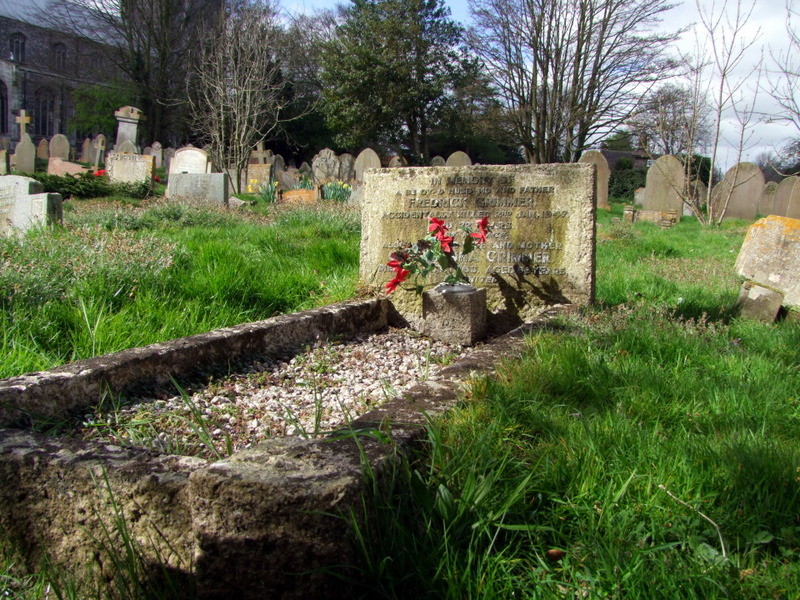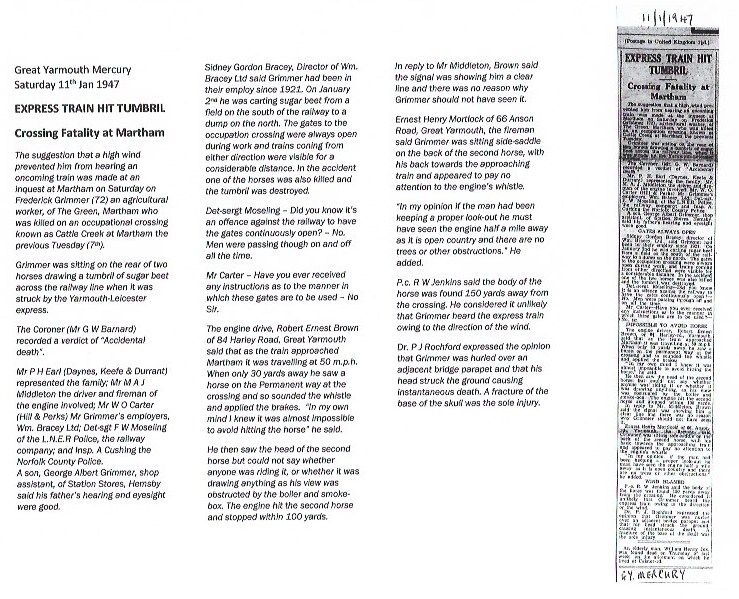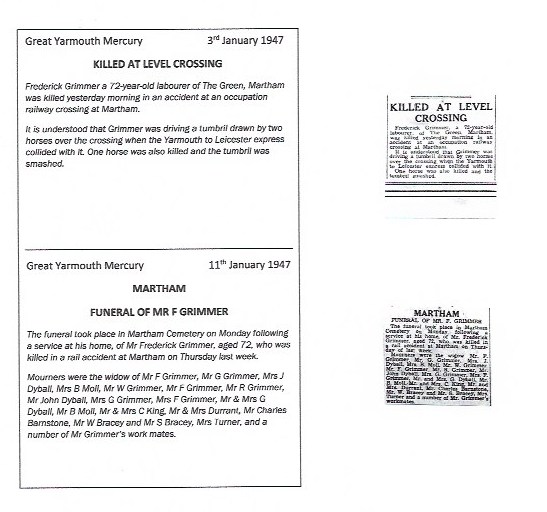Frederick Grimmer (1874-1947) of Martham

Frederick Grimmer was accidentally killed in a tragic accident on 2nd January 1947 whilst leading a tumbril and two horses across the railway. Frederick was born on 16th May 1874 in Martham as the first child of Richard Grimmer and Emily, nee Haywood and grew up with them at Cess. Also known as ‘Punch’ Grimmer he had a spell when, as a teenager, he was a fisherman but was a farm worker and labourer for most of his life working for Wm Bracey & Co. He married Christianna Durrant the daughter of Samuel Durrant & Anna, nee Payne, on 2nd December 1899 at St Mary the Virgin. Together they had three children who were all born in Martham as follows:-
- Blanch A Grimmer was born on 6th April 1900.
- Frederick John Grimmer was born on 9th September 1905.
- George Albert Grimmer was born on 2nd October 1908.
At the inquest into his death his employer Sidney Gordon Bracey, Director of Wm. Bracey Co. said Mr Grimmer had been in their employment since 1921. On January 2nd he was carting sugar beet from a field on the south of the railway to a dump on the north. The gates to the occupation crossing were always open during work and trains coming from either direction were visible for a considerable distance. In the accident one of the horses was also killed and the tumbril was destroyed.
It was said that Frederick was sitting on one of the two horses carting sugar beet across the railway line when it was struck by the Yarmouth-Leicester express.
The engine driver, Robert Ernest Brown of 84 Harley Road, Great Yarmouth said that as the train approached Martham it was travelling at 50 m.p.h. When only 30 yards away he saw a horse on the line at the rural farm crossing known as Cattle Creek and sounded the whistle and applied the brakes. “In my own mind I knew it was almost impossible to avoid hitting the horse” he said.
He then saw the head of the second horse but could not say whether anyone was riding it, or whether it was drawing anything as his view was obstructed by the boiler and smokebox. The engine hit the second horse and stopped within 100 yards.
Brown continued; the signal was showing him a clear line and there was no reason why Grimmer should not have seen the engine.
Ernest Henry Mortlock of 66 Anson Road, Great Yarmouth, the fireman, said Mr Grimmer was sitting side-saddle on the back of the second horse, with his back towards the approaching train and appeared to pay no attention to the engine’s whistle. “In my opinion if the man had been keeping a proper look-out he must have seen the engine half a mile away as it is open country and there are no trees or other obstructions.” He added.
P.c. R W Jenkins said the body of the horse was found 150 yards away from the crossing. He considered it unlikely that Grimmer heard the express train owing to the direction of the wind.
Dr. P J Rochford expressed the opinion that Mr Grimmer was hurled over an adjacent bridge parapet and that his head struck the ground causing instantaneous death. A fracture of the base of the skull was the sole injury.
The other horse, whose name was Monty, stampeded off and was found at Potter Heigham but at least he survived.
The Coroner, Mr G W Barnard, recorded a verdict of “Accidental death”.
Frederick was 72 when he was buried at St Mary the Virgin at section H, plot N26. His wife was also buried there in October 1963.

